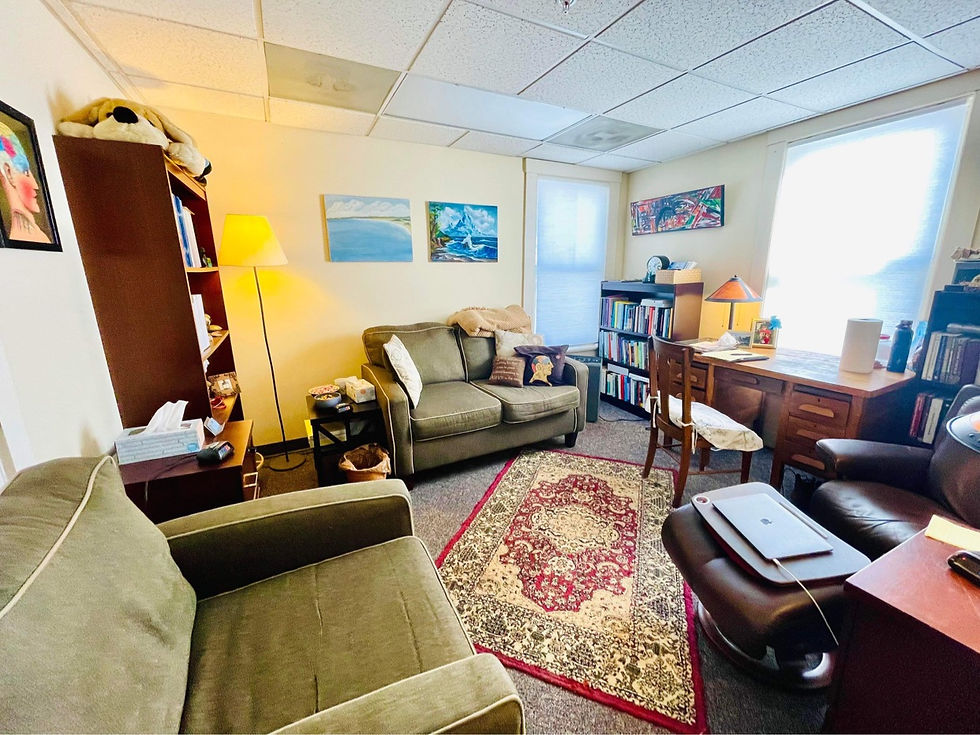


David Radmore, LCSW
David Radmore is a Licensed Clinical Social Worker who received his M.S.W. in Clinical Social Work from Simmons College School of Social Work in 1997 and completed his post-graduate training in psychoanalysis and comprehensive psychotherapy from the National Institute for the Psychotherapies Training Institute in 2004. Prior to moving to Maine, Mr. Radmore worked as the Clinical Manager of the Jamaica Hospital Mental Health Clinic in Jamaica, Queens where he also functioned as a supervisor and faculty member of the Jamaica Hospital Psychiatry Residency Training Program as well as a member of the Mental Health Disaster Response Team. Mr. Radmore maintained a private practice in Manhattan and was a founding clinician for the National Institute for Psychotherapies EMDR/Trauma Clinic. Mr. Radmore specializes in the treatment of trauma and dissociative disorders and is a certified therapist in EMDR (Eye Movement Dissociation and Reprocessing).
Care Philosophy
A few years ago I began experiencing pain in my shoulder; at first, I ignored it but eventually, the pain began to interfere with my functioning. Concerned that my condition required surgical intervention, I kept my pain a secret or minimized it when asked about it. Eventually, the pain became intolerable and I was referred to a Physical Therapist by my PCP.
At the conclusion of my first session with my physical therapist I was informed that I was suffering from a “frozen shoulder” which was secondary to a traumatic injury to my wrist years earlier. I was told that if I chose to proceed, my progress would be largely determined by my effort and commitment to treatment.
The painful process of “unfreezing” my shoulder required weekly or biweekly PT sessions and between sessions, I was expected to practice stretching on a daily basis. To be honest, some days I did them and sometimes I didn’t-wanting to avoid the pain and discomfort that it caused. Eventually, I began to see progress: my flexibility increased, my pain decreased, and I regained full mobility in my shoulder. When I reflected on the entire experience the parallels between my frozen shoulder and the psychotherapeutic process were obvious and helped me to formulate my thinking about psychotherapy and my approach to healing. Like many people, I initially wanted to ignore the pain and minimize or deny the problem. I was worried that addressing it would be painful and scary. Once I started the process of healing I realized that the frozen shoulder wasn’t my fault but the result of an earlier traumatic injury. I also came to understand that my healing was my responsibility; while my physical therapist was there to help, encourage and instruct me, it was on me to do the work outside of PT. Many of us seek out psychotherapy due to old pain which has become unignorable. This pain is often the result of earlier traumatic experiences that have shaped and informed our negative beliefs about ourselves and the world. We find ourselves “frozen” and rigid in our ways of negotiating the world and our relationships.
While some people are genetically predisposed to certain ailments which require medication or other medical interventions, I believe that many mental health issues are the result of earlier traumatic experiences that have impacted both the brain and mind. Numerous studies (http://www.psychiatrictimes.com/psychotherapy/how- psychotherapy-changes-brain) have shown that psychotherapy and certain psychotherapeutic interventions (e.g. EMDR) can permanently change the brain and resolve psychopathology. This is particularly true with conditions due to trauma (e.g. PTSD and Dissociative Disorders).
In my opinion If psychotherapy is successful it often achieves some or all of the following outcomes: Affect Experience: An ability to identify and label the somatic cues which comprise a discrete affective state (“What is my body telling me about what I’m feeling? “How do I identify/name what I’m feeling?”) Affect Tolerance: An ability to tolerate a variety of diverse affective states (“I can make space (mentally and physically) to experience both pleasant and difficult feelings.”) Affect Management: An ability to regulate, contain and shift affective states in an adaptive manner (“I can use my body and mind as resources to manage my feelings.”) Self-Acceptance: A capacity to acknowledge with an easy humility one’s strengths and weaknesses and, (to paraphrase the Serenity Prayer), accept the things you can’t change, and have the courage and perseverance to change the things you can. Self-Care: An ability to consistently care for one’s body and mind in a meaningful way. Interpersonal Communication: To be able to effectively and clearly communicate to others in a manner which is adaptive and furthers intimacy and connection.
Starting psychotherapy and beginning the work of understanding ourselves and making changes in the way we do things can be uncomfortable and difficult. Finding the right therapist who can guide and support your healing can be a life changing and in many cases a life-saving experience.
Treatment Modalities
Psychoanalytically informed psychotherapy (Relational), EMDR, Flash EMDR Brainspotting, Heart Math, Ego State Work, Cognitive-Behavioral Interventions, Supportive Psychotherapy.
Specialties/Clinical Interests
PTSD, Dissociative Disorders, Abuse (Physical/ Sexual), Mood Disorders, Grief/Bereavement, Anxiety Disorders, Phobias, OCD, Men’s Issues, LGBT Issues.
Insurance
Anthem
Aetna
Blue Cross/Blue Shield Cigna
Harvard-Pilgrim
Meritain Health Community Health Options Martins Point
Medicare
MedNet
MHN
Patient Advocates, LLC UBH
United Health
Tri-Care

Contact Me
David Radmore,LCSW
55 Bell Street Portland, ME 04103
Ph(207)233-1464 Fax(207)514-8333
Email: dmradmore@gmail.com